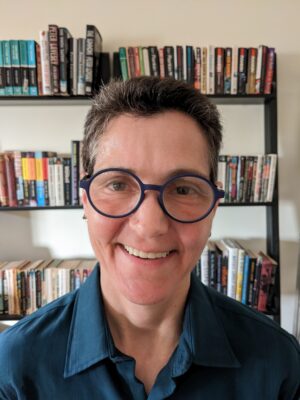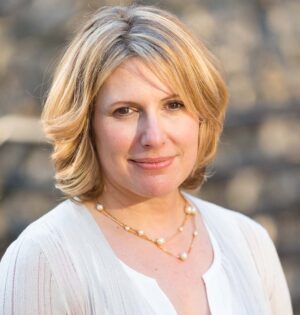Katie Crawford named interim director of Robert Penn Warren Center for the Humanities; Holly Tucker steps down

Katie Crawford, Cornelius Vanderbilt Chair, professor of history, and chair of the Department of Gender and Sexuality Studies, has been named the interim director of the Robert Penn Warren Center for the Humanities. Crawford’s appointment follows the five-year leadership of Holly Tucker, Mellon Foundation Chair in the Humanities and professor of French, who is stepping down to pursue her research and new trans-institutional projects.
Crawford, the author of four books, is an accomplished scholar of gender and sexuality, European history, and visual and popular culture. Crawford is also a dedicated teacher and past winner of the Jeffrey Nordhaus Award for Excellence in Undergraduate Teaching at Vanderbilt.
“I am thrilled to serve as interim director of the Robert Penn Warren Center,” said Crawford. “I believe that the humanities are more important now than ever, as we look for innovative and interdisciplinary solutions to the social, political, and environmental challenges of the 21st century. I look forward to addressing these issues through my leadership of the center.”
Crawford has previously been engaged with the Robert Penn Warren Center as a faculty fellow, as a participant in various seminars, and as a member of the Faculty Advisory Board.
“Katie Crawford is well-positioned to assume leadership of the Rober Penn Warren Center for the Humanities,” said Timothy P. McNamara, Searcy Family Dean of the College of Arts and Science. “Her scholarship, approach, and leadership experience will serve the center well, building on the strong foundation that Holly Tucker has established.” McNamara added, “I am deeply thankful to Holly for her extraordinary leadership of the center and how she has greatly expanded its impact over the years. She has raised the visibility and importance of humanities scholarship across all fields, including in the social and natural sciences.”

Under Tucker’s leadership, the Warren Center contributed to innovative new partnerships and interdisciplinary collaborations.
Tucker secured a National Endowment for the Humanities grant to support immersive undergraduate humanities courses, leading to the creation of 19 interdisciplinary courses that reached more than 230 students. Tucker also played an instrumental role in bringing the humanities into conversations about artificial intelligence, creating and co-directing the Generative AI and the Humanities Seminar series, where faculty and graduate students learn about AI-related topics from guest speakers, get hands-on experience with AI tools, and share their own projects.
“Serving as the director of the Robert Penn Warren Center for the Humanities has been the highlight of my career at Vanderbilt,” Tucker said. “The humanities center has long been cherished by faculty and graduate students from across the humanistic disciplines and beyond. It is a place where research and collegial generosity intersect in such productive and affirming ways. I am proud to have been part of its long history and am delighted by all that we have been able to accomplish under my watch.”
Tucker continued, “While I’ll miss my work at the Warren Center, I’m looking forward to my upcoming research leave to continue projects on generative AI in collaboration with colleagues across the university. I am also delighted that Katie Crawford has agreed to serve as interim director. A longstanding partner in the Warren Center’s work, she is the perfect person to continue its forward trajectory.”
Crawford’s passion for the humanities began when she studied in Italy for a year in high school. Crawford and her mother would spend their Saturdays learning about ancient and Renaissance Rome.
“I took from those experiences an appreciation for thinking about questions and problems that are central to human society and culture,” Crawford said. “The Warren Center is a place where we can think about, study, and learn collectively about the complexities of humanity in amazing interdisciplinary contexts. That is an extraordinary thing.”
In her opinion, the humanities are relevant now more than ever to remind people what it means to be human in an increasingly technological world.
“The humanities disciplines teach people how to think and engage with the human in mind,” she said. “That may sound obvious, but really, if we are going to thrive, or even survive, we need different ways of thinking of all kinds and willingness to think creatively. The humanities, especially in interdisciplinary forms, do just that.”
Looking toward the future, Crawford plans to visit campus partners to hear what people would like to see from the Warren Center as she envisions new programs and initiatives.
“One of the great resources of the Warren Center is that it provides space and support for all sorts of interdisciplinary conversation and collaboration,” she said. “I am both honored and thrilled to be able to help facilitate that, and I invite anyone who has thoughts about the humanities center to reach out. I am more than happy to listen.”
